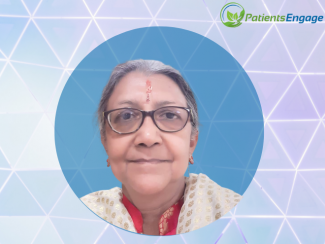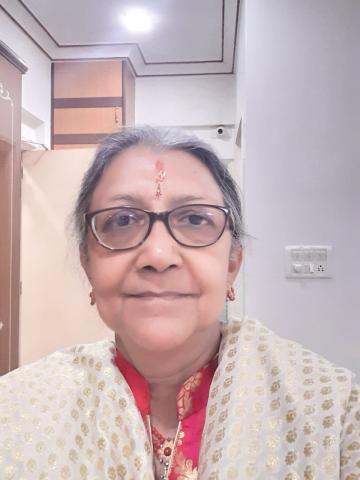
Renu Bhuwalka from Mumbai has lived with hypothyroidism for the over 3 decades. She shares her lived experience from early symptoms to diagnosis and how she managed it well to ensure an active lifestyle.
Please tell us a bit about your condition?
I have had hypothyroidism for the last 36 years. I was diagnosed in 1986, when I was 28 years old.
What were the early symptoms? What made you go to a doctor?
I had over a few months become very lethargic and I thought it was just laziness. I would wake up, brush my teeth, have my tea and want to lie back down again. Through the day, I didn’t want to step out or do any strenuous activities. Even household work was becoming a drag. My parents would keep asking me why I’m in bed all the time. My husband then had been in a car accident so I thought it was stress related along with laziness. However, I had 2 young daughters, so I had to be on my feet. I realized this was not normal. I remembered that my niece who at the time was 5 years old had recently been diagnosed with low thyroid function. I remember thinking what a lethargic child she had been. A few red flags went up and I decided to go meet my GP the next time I was in Mumbai. After marriage, I lived in Delhi but had no GP there.
What tests were done? How did the diagnosis come about?
When I saw my GP, he prescribed an array of tests and insisted I do them all. The thyroid hormone test was done too and in those days, results took more than 36 hours to come. As soon as the test reports came, he referred me to an Endocrinologist, who explained to me that I had low thyroid hormones produced from my thyroid gland. I would need to take a pill for the rest of my life and he started me on 50mg thyroxine.
What was your reaction to the diagnosis?
It was a relief in a sense, that I now knew what was causing the change in my energy levels. Since we saw my niece go through it, it was not worrisome. I knew it was a manageable condition but I had to keep an eye on it my entire life.
What happened next?
I came back to Delhi and started taking this medication everyday. It took about 10 days for the effects of the drug to take over. I was surely more energetic, and enthusiastic about doing the work around the house. I did feel much better but I was not there a 100%. I informed the doctor about this and he upped my dosage to 100 mg. The dosage adjustment helped but again it did not feel right. I felt, it was too much for me. So almost after a year of trying to get used to it, I went and told him about it. This time, he repeated my hormone tests and based on that, reduced my dose to 75 mg. To this day, I am on this same dosage.
What were the most bothersome symptoms?
Before diagnosis, the lethargy was the major symptom that was difficult to manage. Irritability came with it. I have noticed that even with my mother and daughter. Dry skin continues to be an issue. In Delhi winters, sometimes even if my nails touched my skin, it would bleed. I use a lotion or moisturizer daily.
Were there any lifestyle changes you had to make?
Not really. I have no diet restrictions. Once a doctor had told me to avoid eating cabbage, brussel sprouts and broccoli as these interfere with the hormones. This was in the early 90s and besides cabbage, the other veggies weren’t even available in India. I may have avoided cabbage for a while but not as a fixed thing.
I used to exercise a lot earlier but post the pandemic, my routine has stopped. However, I am a fairly active person and daily life includes cooking, shopping, tending to the house, walking my dog, watering my plants, painting and spending time with my grandchild.
What medications are currently on? Pls mention all allopathic, supplemental, herbal and any alternative medicines and indications of each.
- Thyronorm for hypothyroidism
- Calcium and vitamin supplements
Were there any side-effects of the medicines? If yes, how do you manage them?
I have no side-effects so far.
What kind of specialists did you consult and how often?
I see my Endocrinologist as and when required. I get my thyroid levels checked every year, along with a full body check-up.
Do you have a family history of this condition? Is it an inherited disorder?
Most definitely. First, there was my niece. My mother was diagnosed with it after me. My older daughter was detected with it when she was about 25 years old before her marriage. When she was a teenager, I had noticed weight gain, so I had started getting her tested regularly. My younger daughter was detected with it in her early 30s. She was also putting on weight and when I noticed it, insisted she do the test.
I have two young grandchildren and I’m sure my daughters will screen them in due time.
What is your present condition?
I continue to be on 75 mg with my Endocrinologist. I have no other co-morbidities.
What is your advice to patients who face similar challenges?
My advice to other people with Hypothyroidism would be to remember that it is a life long condition, so keep testing and monitoring it. This will also help you to be on the right dose so that other organs are not affected.

Updated on 2nd May 2023
With deep regret, we wish to inform our readers that Renu Bhuwalka passed away in April 2023. We are forever grateful to her and her family for sharing her rich experience which will help patients in a similar situation.






